Hist 1b - Study guides, Class notes & Summaries
Looking for the best study guides, study notes and summaries about Hist 1b? On this page you'll find 48 study documents about Hist 1b.
Page 3 out of 48 results
Sort by
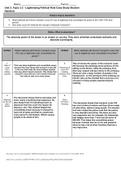
-
HIST 1b - Unit 3_ Legitimizing Political Rule (Student Handout) 2023
- Exam (elaborations) • 4 pages • 2023
- Available in package deal
-
- $8.49
- + learn more
Unit 3: Topic 3.2 - Legitimizing Political Rule Case Study Student Handout Today’s Inquiry Questions ● What methods did French monarch Louis XIV use to legitimize and consolidate his power in the 1450-1750 time period? ● How does Louis XIV embody the concept of absolute monarchy? Define: What is absolutism? The absolute power of the leader in an empire or country. They have unlimited centralized authority and absolute sovereignty. Artifact What methods did French monarch Louis XI...
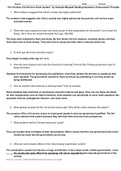
-
HIST 1b Examination System - Discussion Q_s.
- Exam (elaborations) • 3 pages • 2023
- Available in package deal
-
- $8.49
- + learn more
The Chinese Civil Service Exam System” by Ichisada Miyazaki Reading Questions & Discussion Prompts 1. What evidence suggests that China’s society was highly patriarchal? The evidence that suggests why China’ society was highly patriarchal because the civil service exam excluded women. 2. What were boys expected to learn and study as part of their preparations for the exams? List at least five things. (Hint: there are several examples from pgs. 288-290) The boys were expected to learn...

-
HIST 1b Unit 5_ Changes & Continuities in the Industrial Revolution
- Exam (elaborations) • 3 pages • 2023
-
- $9.49
- + learn more
Unit 5 - Changes & Continuities in the Industrial Revolution (AMSCO pgs.297-356) Changes Continuities Social ● The Industrial Revolution resulted in a huge population transfer of people moving from rural to city areas(urbanization). ● Need for labor in factories increased. ● Working-class was formed. Low wages, long hours, poor conditions, small housing, crowded and polluted living. ● Women still relied on men for income. ● Pre-industrial occupations are still included with t...

-
HIST 1b Unit 4 - Labor Systems Graphic Organizer 1450-1750
- Exam (elaborations) • 3 pages • 2023
- Available in package deal
-
- $8.49
- + learn more
Unit 4: Labor Systems, 1450 - 1750 C.E. Encomienda Chattel Slavery Russian Serfdom ● Define the labor system ● Include the general role/purpose ● Were there revolts or rebellions associated with it? The Encomienda system was a labor system started by the Spanish crown in the American colonies, In this system, a Spanish Encomiendero was granted a number of native laborers who would pay tributes to him in exchange for his protection. A chattel slave is an enslaved child wh...

-
HIST 1b Unit 5_ Land Empire Reforms_Industrialization.
- Exam (elaborations) • 3 pages • 2023
- Available in package deal
-
- $8.49
- + learn more
Unit 5: Land Empires – Reform and Modernization (AMSCO pgs 317-321; 334-338) Ottoman Empire Japan (Meiji Era) What caused or instigated the reform movements in this empire? They worry about outside empires interfering with them. They were particularly concerned with European powers interfering with their affairs. Which led to the reform movements in this empire. When their feudal system began to crumble, they had to start making changes. They were able to legitimize the rule by re...

-
HIST 1b Unit 5_ Changes & Continuities in the Industrial Revolution
- Exam (elaborations) • 3 pages • 2023
- Available in package deal
-
- $9.49
- + learn more
Social ● The Industrial Revolution resulted in a huge population transfer of people moving from rural to city areas(urbanization). ● Need for labor in factories increased. ● Working-class was formed. Low wages, long hours, poor conditions, small housing, crowded and polluted living. ● Women still relied on men for income. ● Pre-industrial occupations are still included with the middle class. ● Political ● People demanded the ability to exercise their “natural rights.” ...
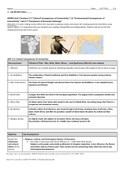
-
HIST 1b 2.5-2.7 Reading Questions.APWH|Unit 2 Sections 2.5 “Cultural Consequences of Connectivity,” 2.6 “Environmental Consequences of Connectivity,” and 2.7 “Comparison of Economic Exchange”
- Exam (elaborations) • 7 pages • 2023
- Available in package deal
-
- $8.49
- + learn more
UNIT 2.5| Cultural Consequences of Connectivity Key term/event Definition (Think - Who, What, When, Where…) and Significance (Why this term matters) 1. Diffusion (Definition not in book) Spread of something (typically cultural aspect like religion) from its place of origin 2. Zen Buddhism The combination of Daoist traditional and Chan Buddhism. It has become popular among ordinary Chinese citizens. 3. Neo-Confucianism The fusion of rational thought and abstract ideas from Daoism and Buddh...
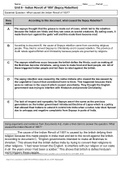
-
HIST 1b Unit 6 - Indian Revolt of 1857 Handout.
- Exam (elaborations) • 2 pages • 2023
- Available in package deal
-
- $8.49
- + learn more
Unit 6 - Indian Revolt of 1857 (Sepoy Rebellion) Essential Question: What caused the Indian Revolt of 1857? Docu ment According to this document, what caused the Sepoy Rebellion? A The sepoys thought that the grease is made out of cows, which led to the rebellion because the Indian are hindu and they see cows as sacred creatures. By eating cows, it made them turn against the gods' will and this made them become mad. B According to document B, the cause of Sepoys rebellion came from conv...
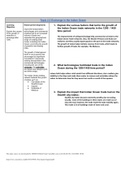
-
HIST 1b 2.3 Powerpoint Organizer updated 2023
- Exam (elaborations) • 2 pages • 2023
-
- $10.49
- + learn more
1. Explain the various factors that led to the growth of the Indian Ocean trade networks in the 1200 - 1450 time period: The improvement of sailing technology help connects Dar-al Islam to the Indian Ocean Trade networks. Also, the Muslim Persians and Arabs are seafarers and they usually export goods to the port in the trade networks. The growth of states helps institute revenue from trade, which leads to further growth of trade, for example, The Melacca. 2. What technologies facilitated...
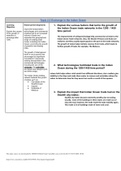
-
HIST 1b 2.3 Powerpoint Organizer latest Fall 2023
- Exam (elaborations) • 2 pages • 2023
- Available in package deal
-
- $8.49
- + learn more
Topic 2.3 Exchange in the Indian Ocean Learning Objective Explain the causes of the growth of networks of exchange after 1200. Historical Developments Improved transportation technologies and commercial practices led to an increased volume of trade and expanded the geographical range of existing trade routes, including the Indian Ocean, promoting the growth of powerful new trading cities. The growth of interregional trade in luxury goods was encouraged by significant innova...

$6.50 for your textbook summary multiplied by 100 fellow students... Do the math: that's a lot of money! Don't be a thief of your own wallet and start uploading yours now. Discover all about earning on Stuvia


